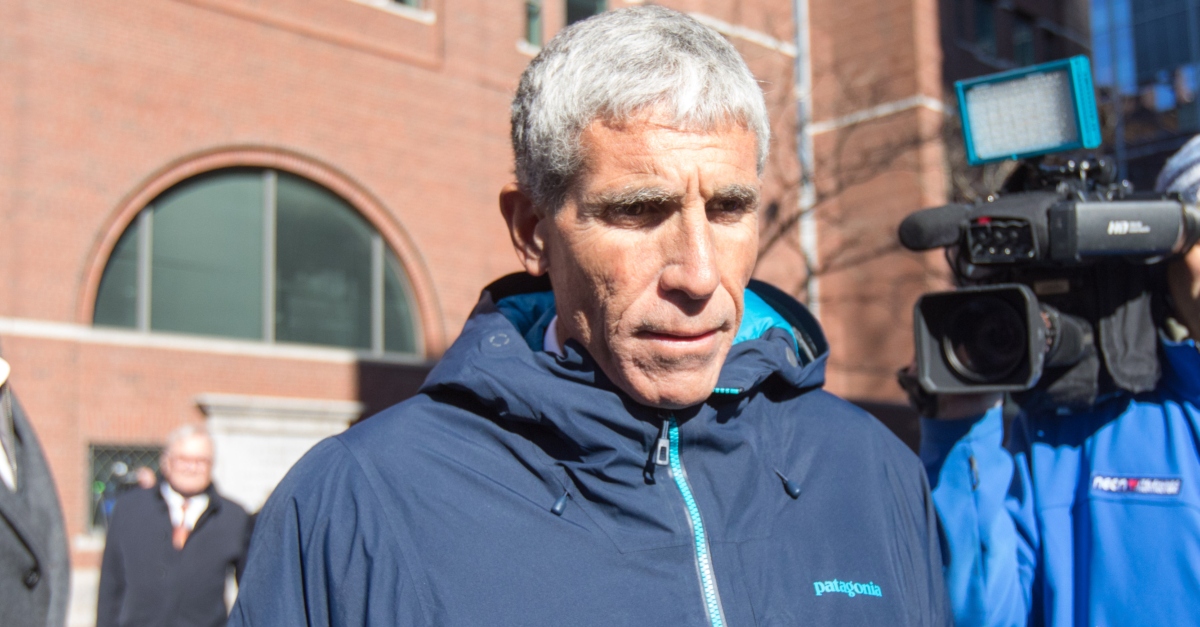
William “Rick” Singer appears in court in connection with the college admissions bribery scandal. (Photo via Scott Eisen at Getty Images)
The man described as the “architect” of a college admissions bribery scandal that ultimately led to the convictions of more than 50 people will spend the next 3.5 years behind bars.
William “Rick” Singer, the mastermind behind the multi-million dollar scheme that has yielded dozens of convictions and exposed the criminal activity of parents desperate to ensure their children’s admission to college, was sentenced to 42 months in prison on Wednesday.
U.S. District Judge Rya W. Zobel, a Jimmy Carter appointee, also sentenced Singer to three years of supervised release and ordered a forfeiture of more than $10 million.
Before Wednesday’s sentencing, federal prosecutors reached for superlatives in describing fraudster Singer’s central role in a massive scheme to corrupt the college admissions process, in a scheme that implicated celebrities like Felicity Huffman, Lori Loughlin, her husband Mossimo Giannulli and many others.
“Singer was the architect of a massive, decade-long scheme to use fraud and bribery to secure the admission of high school students to elite colleges and universities across the country,” prosecutors wrote in a sentencing memo. “The unraveling of that scheme as part of the government’s Operation Varsity Blues ultimately led to the conviction of more than 50 parents, coaches, and Singer associates.”
In a scheme that led to the conviction of dozens, Singer operated a college counseling and prep business known as “The Key” along with a purported educational charity for disadvantaged youth associated with it: The Key Worldwide Foundation.
Prosecutors now call that non-profit entity a “criminal enterprise,” which paid off test proctors to cheat on college entrance exams and bribed coaches and administrators to designate applicants as athletic recruits.
“As the orchestrator and leader of the scheme, the most culpable participant in it, and the defendant who profited from it the most, Singer deserves a sentence significantly exceeding the high end of that range,” the government’s sentencing memo says.
Despite that blistering language, prosecutors wanted to give Singer a sentencing break because of his “exceptionally valuable” cooperation with their investigation. The sentencing guidelines called up to nearly 20 years imprisonment, but the prosecutors ultimately requested a six-year sentence, along with a three-year term of supervised release.
Singer’s cooperation, they added, was “plagued by missteps.”
“In short, Singer’s cooperation is unprecedented in scope in this District,” the government’s memo says. “At the same time, he obstructed the government’s investigation, and the government ultimately chose not to call him as a witness at trial. While Singer’s cooperation was both singularly valuable and singularly problematic, it warrants a significant downward departure from the low end of the Sentencing Guidelines range as calculated by the parties in their plea agreement.”
In the defense’s reply, Singer’s attorney Candice L. Field blamed her client’s childhood trauma and his “win at all costs” mindset for his downfall.
“Rick has spent his life helping kids succeed,” Field wrote in a 26-page filing. “For decades, he worked tirelessly to support students in their athletic and academic pursuits. His success as a college admissions counselor eventually attracted wealthy clients who desperately wanted their children to attend the most elite schools. Driven by a need to ‘win at all costs,’ instead of governing the parents’ unrealistic expectations, he satisfied them by means of bribery and fraud.”